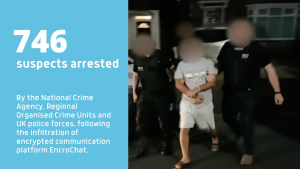Jury Trials and Covid 19
June 24, 2020Sentencing – Beware the Cliff Edge
July 10, 2020Encrochat and ‘Operation Venetic’
[Image credit: National Crime Agency, Crown Copyright reproduced under licence]
The National Crime Agency this week announced that it had infiltrated the secure messaging system ‘Encrochat’, said to be used exclusively by people engaging in criminal activity. Operation Venetic has so far resulted in 746 arrests, and the seizure of:
• Over £54million in cash
• 77 firearms, including an AK47 assault rifle, submachine guns, handguns, four grenades, and over 1,800 rounds of ammunition
• More than two tonnes of Class A and B drugs
• Over 28 million Etizolam pills (street Valium) from an illicit laboratory
• 55 high-value cars, and 73 luxury watches
Also, a specialist NCA team, working closely with policing partners, has prevented rival gangs carrying out kidnappings and executions on the UK’s streets by successfully mitigating over 200 threats to life.
The NCA says that:
“There were 60,000 users worldwide and around 10,000 users in the UK – the sole use was for coordinating and planning the distribution of illicit commodities, money laundering and plotting to kill rival criminals.”
The issue of encryption
There are three main issues with relying on encryption:
1. Is it, in fact, secure?
2. Is access to the device secure? So, by way of example, robust encryption, such as that offered by WhatsApp, is of little use if you can access your device with a four-digit pin.
3. Is your criminal network to be trusted?
Evidential Issues
When the Operation Venetic cases reach court, we will be focussing on the admissibility of any evidence taken from encrypted devices.
Questions to be answered include:
1. Was there a commercial breach of confidentiality by the service provider?
2. Was there an illegal seizure of devices, at any stage?
3. Was a ‘Trojan Horse’ code put into place, and if so on what legal authority?
4. What were surveillance/intercept authorisations deployed, if any, and was the legal framework followed?
5. Were property and privacy rights infringed?
It is likely that these questions cannot be answered in isolation so far as the conduct of UK law enforcement is concerned, and that we will need to focus sharply on the interaction with foreign police forces and security services.
The prosecution will likely seek to assert public interest immunity to protect its investigation techniques (we have seen this tactic deployed in recent cases); this is a complex legal area that we are familiar with, so can meet such challenges head-on.
If you face investigation or prosecution, get in touch to ensure the highest quality legal representation.
How can we help?
If you need specialist advice, then get in touch with any member of our vastly experienced Criminal Defence team, for assistance with any criminal law related matter.
–
Mr John Stokes (John.Stokes@danielwoodman.co.uk),
Mr Anthony Pearce (Anthony.Pearce@danielwoodman.co.uk) or
Mr Daniel Woodman (Daniel.Woodman@danielwoodman.co.uk).



